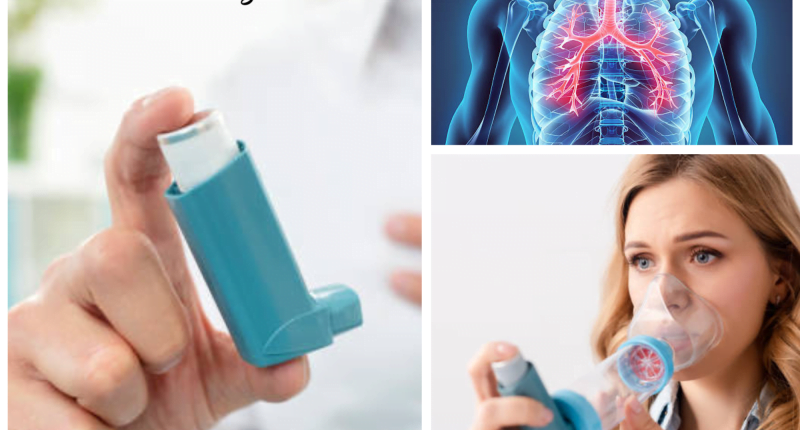Bronchial asthma is a chronic respiratory condition that affects millions of people worldwide. It is characterized by recurrent episodes of wheezing, coughing, chest tightness, and shortness of breath. In this article, we will explore the symptoms, causes, risk factors, diagnosis, and treatment options for this asthma condition.
Symptoms of Bronchial Asthma
The symptoms of bronchial asthma can vary from person to person and may include:
- Wheezing (a whistling sound when breathing)
- Coughing (especially at night or early morning)
- Shortness of breath
- Chest tightness or pain
- Difficulty breathing
- Rapid breathing
- Fatigue
- Anxiety
Causes
The exact cause of bronchial asthma is not fully understood, but it is believed to be a combination of genetic and environmental factors. Some of the common triggers of asthma attacks include:
- Allergens, such as pollen, dust mites, and pet dander
- Air pollution
- Tobacco smoke
- Respiratory infections, such as colds and flu
- Exercise
- Stress and anxiety
- Cold air
Risk Factors
Several risk factors may increase the likelihood of developing bronchial asthma, including:
- Family history of asthma
- Personal history of allergies or eczema
- Being overweight or obese
- Exposure to environmental factors, such as pollution or tobacco smoke
- Being a smoker or exposed to secondhand smoke
- Certain occupations, such as farming, hairdressing, and manufacturing
Diagnosis of Bronchial Asthma
Asthma is usually diagnosed based on a combination of medical history, physical examination, and diagnostic tests. The doctor may ask about your symptoms and medical history, perform a physical exam, and order one or more of the following tests:
- Spirometry: This test measures how much air you can exhale after taking a deep breath and how fast you can exhale.
- Peak flow: This test measures how fast you can exhale air out of your lungs.
- Allergy testing: This test can help identify specific allergens that may trigger asthma attacks.
- Chest X-ray or CT scan: This test can help rule out other lung problems that may cause similar symptoms.
Also read | Orbital Cellulitis Treatment , Symptoms and Causes
Treatment of Bronchial Asthma
The goal of treatment for bronchial asthma is to manage symptoms, prevent flare-ups, and improve quality of life. Treatment options may include:
- Inhalers: These devices deliver medication directly to the lungs, which can help relieve symptoms and prevent asthma attacks.
- Oral medications: These may include leukotriene modifiers, corticosteroids, and beta-agonists, which can help reduce inflammation and open up the airways.
- Allergy shots: Also known as immunotherapy, these shots can help reduce sensitivity to specific allergens that may trigger asthma attacks.
- Lifestyle changes: These may include avoiding triggers, quitting smoking, maintaining a healthy weight, and managing stress.
- Emergency treatment: If you experience severe symptoms or an asthma attack, you may need emergency treatment, such as oxygen therapy, nebulizers, or intravenous medications. [1]
Tips to manage Bronchial Asthma
Identify and avoid triggers: Asthma triggers can vary from person to person and may include allergens (such as pollen, dust mites, and pet dander), air pollution, respiratory infections, exercise, and stress. Identifying your triggers and taking steps to avoid them can help prevent asthma symptoms from occurring.
Follow an asthma action plan: An asthma action plan is a written plan that outlines what to do in the event of an asthma attack or worsening of symptoms. It may include information on medications to take, when to seek medical help, and steps to take to prevent future attacks.
Take medications as prescribed: There are various medications available for the treatment of asthma, including quick-relief medications (such as short-acting bronchodilators) and long-term control medications (such as inhaled corticosteroids). It is important to take these medications as prescribed by your healthcare provider, even if you are feeling well.
Use inhalers correctly: Inhalers are a common treatment for asthma and are available in various types, including metered-dose inhalers (MDIs) and dry powder inhalers (DPIs). It is important to use inhalers correctly to ensure that the medication reaches the lungs and is effective in treating asthma symptoms.
Maintain good overall health: Good overall health can help prevent asthma attacks and reduce the severity of symptoms. This includes maintaining a healthy diet, getting regular exercise, and avoiding smoking and exposure to secondhand smoke.
Regularly monitor symptoms: Keeping track of asthma symptoms can help you identify triggers and adjust your treatment plan accordingly. Your healthcare provider may recommend using a peak flow meter or spirometer to monitor your lung function.
Stay informed: Keep up-to-date with the latest research and information on asthma management, including new treatments and strategies for prevention and symptom control. Talk to your healthcare provider about any concerns or questions you may have about managing your asthma.
Conclusion
B.asthma is a chronic respiratory disease that affects millions of people worldwide. While the exact cause is not fully understood, it is believed to be a combination of genetic and environmental factors. Common symptoms include wheezing, shortness of breath, chest tightness, and coughing. If you think you may have asthma, it is important to see a doctor for a diagnosis and appropriate treatment.
FAQs
A: No. There is no cure for bronchial asthma, but it can be managed with appropriate treatment and lifestyle changes.
A: Common triggers of asthma attacks include allergens, air pollution, respiratory infections, exercise, stress, and cold air.
A: Asthma is usually diagnosed based on a combination of medical history, physical examination, and diagnostic tests such as spirometry, peak flow, allergy testing, and chest X-ray or CT scan.
A: While there is no cure for bronchial asthma, it can be managed through lifestyle changes, avoiding triggers, and appropriate medical treatment.
A: Severe asthma attacks can be life-threatening, but with appropriate treatment and management, most people with asthma can live normal, active lives.









